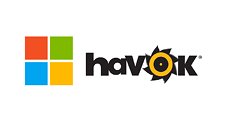Sunday, April 30th 2017

Microsoft Trademarks Direct Physics - HAVOK Rebranded?
As you might recall, Microsoft bought HAVOK from Intel back in 2015, promising to "add Havok's IP to its existing tools and platforms, including DirectX 12, Visual Studio, and Azure." Well, it would seem we are seeing the fruits of that particular seeding, with Microsoft having trademarked "Direct Physics".
With Microsoft having previously talked about integrating HAVOK with its DX12 API, that is probably the most probable scenario for this trademark. A tighter, in-DX12 integration could possibly allow for the physics workflow to have increased performance under the API, which is something we can all get behind of. However, this also begs the question as to what exactly happens to HAVOK licensing in the process. I myself wouldn't expect Microsoft to put its HAVOK tools and libraries behind a DX12 implementation wall - the number of companies who license those libraries aren't few in number. So my guess is that Microsoft is simply rebranding the HAVOK middleware for integration under its DX12 API, which could mean opening up its libraries to any game that makes use of DX12.This is where things get interesting, because this would allow would-be licensees of HAVOK to take one of two paths for acquiring the tool-kits and workflows on the physics middleware: either license it, or get it for free by developing their games under DX12. If so, and I would wager this is the scenario playing out at Microsoft, the company can still monetize its HAVOK IP to anyone who doesn't want to implement DX12, while at the same time, increase the likelihood of developers adopting DX 12 as their development API of choice. This would naturally help Microsoft in gaining the upper hand against Vulkan - arguably the better choice from a developer's perspective due to its greater cross-platform flexibility. At the same time, Microsoft could ensure more games are developed under its poster-child and ecosystem-foundation (both in consoles and PCs) DX12.
As a reminder, many high-profile games make use of the HAVOK libraries and workflows, such as 343 Industries' Halo 5: Guardians, Bungie's Destiny, and more recently, Nintendo's The Legend of Zelda: Breath of the Wild, just to name a few.
Sources:
Trademarks.justitia.com, WCCFTech
With Microsoft having previously talked about integrating HAVOK with its DX12 API, that is probably the most probable scenario for this trademark. A tighter, in-DX12 integration could possibly allow for the physics workflow to have increased performance under the API, which is something we can all get behind of. However, this also begs the question as to what exactly happens to HAVOK licensing in the process. I myself wouldn't expect Microsoft to put its HAVOK tools and libraries behind a DX12 implementation wall - the number of companies who license those libraries aren't few in number. So my guess is that Microsoft is simply rebranding the HAVOK middleware for integration under its DX12 API, which could mean opening up its libraries to any game that makes use of DX12.This is where things get interesting, because this would allow would-be licensees of HAVOK to take one of two paths for acquiring the tool-kits and workflows on the physics middleware: either license it, or get it for free by developing their games under DX12. If so, and I would wager this is the scenario playing out at Microsoft, the company can still monetize its HAVOK IP to anyone who doesn't want to implement DX12, while at the same time, increase the likelihood of developers adopting DX 12 as their development API of choice. This would naturally help Microsoft in gaining the upper hand against Vulkan - arguably the better choice from a developer's perspective due to its greater cross-platform flexibility. At the same time, Microsoft could ensure more games are developed under its poster-child and ecosystem-foundation (both in consoles and PCs) DX12.
As a reminder, many high-profile games make use of the HAVOK libraries and workflows, such as 343 Industries' Halo 5: Guardians, Bungie's Destiny, and more recently, Nintendo's The Legend of Zelda: Breath of the Wild, just to name a few.




26 Comments on Microsoft Trademarks Direct Physics - HAVOK Rebranded?
Remember Half-Life 2? It was one of the first notable games using Havok and the physics kicked ass:
You can't incorporate HW accelerated physics into gameplay if not all users can utilize it, which is why PhysX remained at "gimmick" level of integration with desperate gimping of CPU physics to make it look better and more meaningful. But with standardization, we can see that in near future.
Now I'm waiting again for the return of damn DirectSound 3D again... Audio has been gimped and neglected for WAY TOO LONG. This generic flat sounding software audio is making me vomit...
Edit: Just looked at when Havok's last stable release was: September 14, 2011. *insert Intel hate here*
Red Faction Guerilla was the best example of what Havok could do.
en.wikipedia.org/wiki/Bullet_%28software%29
Here's a list:
Newton Game Dynamics is an open source physics engine for realistically simulating rigid bodies in games and other real-time applications.
Box2D is a free open source 2-dimensional physics simulator engine written in C++.
Open Dynamics Engine (ODE) is a physics engine written in C/C++. Its two main components are a rigid body dynamics simulation engine and a collision detection engine. It is free software licensed both under the BSD license and the LGPL.
Tokamak Game Physics SDK is an open-source physics engine. At its beginnings, Tokamak was free for non commercial uses only. Since May 2007, it has become open sourced under a BSD License. Now it can be used under BSD or Zlib license.
There's even a open source physics abstraction layer available that allows switching through the above physics engine including Bullet. en.wikipedia.org/wiki/Physics_Abstraction_Layer
Edit: Click on the physics engines I listed above to find out which commercial games used a open source physic engine btw.
Newton: 2015
Box2D: 2014
ODE: 2015
Tokamak: 2008
I think by Direct Physics simply existing, the open source community will coalesce around a standard for developers to target on Android, Windows, OSX, and *nix platforms. Bullet looks like it would probably be the best starting point for that because it is already OpenCL accelerated. I think if Khronos Group and SIGRAPH pushed Bullet (or some other OpenCL physics API), it would take off.
Same for ODE on Bitbucket. bitbucket.org/odedevs/ode/
Found a couple more going by the names SPlisHSPlasH, and PositionBasedDynamics.www.interactive-graphics.de/
Like I said, I think Direct Physics will be the spark to make it happen. PhysX has always been too niche for open source developers to get organized.
I have hopes for this move... It would be nice..